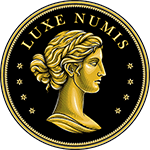The world of ancient coin collecting offers a tangible connection to history but raises important ethical questions about the ethical sourcing of coins. This article explores how collectors and archaeologists ensure the ethical sourcing of ancient coins, guiding them from discovery to collections or museums.
Ancient Coin Hoards: Treasures Hidden in Time
Ancient coin hoards represent some of the most exciting finds in numismatics. These hoards, buried or concealed during times of conflict or economic uncertainty, provide insights into ancient civilizations’ economic and cultural lives.
One famous discovery is the Hoxne Hoard, unearthed in Suffolk, England, in 1992. It included over 15,000 Roman coins, along with jewelry and silverware, buried during the late Roman Empire. Another significant find is the Frome Hoard, discovered in Somerset, England, in 2010. With over 52,000 Roman coins, it stands as one of the largest collections ever found in Britain. These discoveries excite collectors and offer valuable historical insights.
The Context of Hoards: Vessels, Coin Types, and Cultural Groupings
The context of hoards varies widely. Some hoards appear in ceramic pots, while others use bags or boxes made of organic materials, which often decay over time. Owners chose these vessels based on their intent, whether to retrieve the hoard later or hide it from invaders or thieves.
When examining these hoards, certain patterns emerge. Hoards often contain similar types of coins, suggesting a short accumulation period. For instance, Roman denarii might be found together, while Greek tetradrachms or Byzantine solidi could form other hoards. Some hoards include a mix of coin types, reflecting trade and cultural interactions.
Cultural groupings within hoards reveal much about ancient societies. Greek, Roman, Byzantine, and Celtic coins typically cluster in hoards that reflect the geographical and cultural boundaries of their time. In regions with significant trade or military activity, coins from different cultures often appear together. For example, Roman coins might lie alongside Celtic currency in areas where the Roman Empire expanded into Celtic territories.
Legal Export and Ethical Considerations

Countries vary significantly in their legal export regulations for ancient coins. Italy and Greece, for instance, enforce strict laws to protect their cultural heritage, including ancient coins. These countries require export permits, and coins must often remain within national borders unless part of a legal sale or museum loan.
Conversely, the United Kingdom operates under the Treasure Act. This law encourages finders of coin hoards to report their discoveries. If declared treasure, the finder receives a reward based on market value. These coins can then be sold or exported legally, following the proper procedures.
Ethical sourcing demands careful consideration from collectors and dealers. They must ensure their coins come from legal channels, verifying the provenance of each item. Coins with clear provenance have a documented ownership history, reducing the risk of purchasing looted or illegally exported artifacts.
Why Some Coins Are in Museums and Others Aren’t
Collectors and enthusiasts often wonder why some ancient coins end up in museums while others enter private collections. Museums play a vital role in preserving ancient coins for public education and research. They often acquire coins with significant historical or cultural value, especially those that are part of larger archaeological contexts.
However, not all coins make it to museums. Many coins, particularly those found in large hoards, may lack the rarity or historical significance needed for museum acquisition. Museums might keep only a representative sample, allowing the remainder to enter the private market. Additionally, coins with less historical context or those legally exported and sold may be available for collectors.
The decision to place a coin in a museum or private collection depends on factors like rarity, historical significance, and legal considerations. Museums often collaborate with collectors and dealers to ensure important coins receive the preservation they deserve, whether in public institutions or private collections.
Conclusion
The journey of ancient coins from discovery to collection involves a complex interplay of history, legality, and ethics. Understanding the ethical sourcing of ancient coins empowers collectors to make informed decisions, contributing to the preservation of cultural heritage. By respecting the legal and ethical guidelines governing the acquisition and ownership of ancient coins, collectors can enjoy these artifacts’ beauty and history while safeguarding them for future generations.
As numismatics continues to evolve, the importance of ethical sourcing and responsible collecting remains paramount. Whether you are a seasoned collector or new to ancient coins, staying informed and vigilant ensures the treasures of the past remain preserved and appreciated for years to come. Head over to the Luxe Numis Shop to grab a piece of history for yourself!

